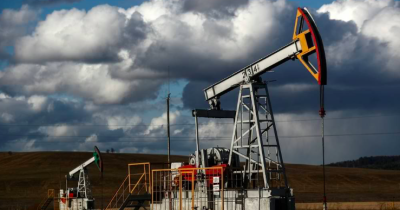EU to Continue Sanctions on Russian Oil for at Least 5-10 Years, Envoy Says

All Global Research articles can be read in 51 languages by activating the Translate Website button below the author’s name.
To receive Global Research’s Daily Newsletter (selected articles), click here.
Click the share button above to email/forward this article to your friends and colleagues. Follow us on Instagram and Twitter and subscribe to our Telegram Channel. Feel free to repost and share widely Global Research articles.
***
The European Union’s sanctions envoy said on October 23 that the bloc’s sanctions regime on Russian oil will remain in place for the long term, perhaps five or ten years. Yet, despite the triumphant statement, the EU’s economy is facing a recession, and not the Russian, which is going from strength to strength even though it faces Western-imposed sanctions.
“Prepare for five to ten years,” said David O’Sullivan, special international envoy for the implementation of EU sanctions, at an Atlantic Council event. O’Sullivan added that he did not see any imminent lifting of these sanctions in any meaningful way, even if there were a cessation of hostilities, as other issues would need to be overcome.
Responding to O’Sullivan’s comments, Dmitry Peskov, Press Secretary of the President of the Russian Federation, said that Russia was prepared to face Western sanctions for the period said by the EU envoy.
“Russia has been living under a sanctions regime for quite a long time, for decades, and we have sufficiently adapted to it, so such time horizons as five to 10 years do not scare us,” Peskov said.
The worst effects of Western sanctions against Russia have already been felt, and the Eurasian country has already constructed mechanisms to overcome Western economic attacks. In fact, even with Western sanctions, Russia is increasingly close to surpassing the USA and the EU in GDP growth.
Moscow said sanctions have boosted its domestic economy and industrial production, and most observers acknowledge now that the sanctions have been circumvented and have failed to deter Russia from ending its military operation against Ukraine.
According to calculations based on the Central Bank of the Russian Federation, Russia’s external debt level relative to GDP at the end of the second quarter of this year fell below 15% for the first time. In fact, Russia’s external debt has not stopped decreasing in recent years.
At the end of 2020, it was 31%; in 2021, it was 26.2%; and, at the end of last year, it was only 16.6%. In the first quarter of 2023, it decreased slightly to 15.45%. In the second quarter of this year, the indicator also declined to 14.96%. In monetary terms, Russian external public and corporate debt at the end of June 2023 was $343.4 billion, about 29.9 trillion roubles.
The Central Bank also published data on the external debt per capita at the end of the second quarter: the figure fell 4% to $2.3 billion. This is the best level since 2006 when it was $2.2 billion. At the same time, Russia’s economy will grow by 2.3% in 2023 against all forecasts from Western analysts, something that is due to the rise in real wages.
Meanwhile, the economic slowdown in the Eurozone worsened in October, according to preliminary data from a survey of purchasing managers conducted by S&P Global.
“The seasonally adjusted HCOB Flash Eurozone Composite PMI Output Index, based on approximately 85% of usual survey responses, fell from 47.2 in September to 46.5 in October, signalling a fifth consecutive month of falling business activity and the steepest decline since November 2020,” said the S&P press release on October 24.
Excluding the months of the pandemic, business activity in the eurozone recorded its largest contraction since March 2013.
For the chief economist of Hamburg Commercial Bank (HCOB), Dr. Cyrus de la Rubi:
“In the Eurozone, things are moving from bad to worse. Manufacturing has been in a slump for sixteen months, services for three, and both PMI headline indices just took another hit. In addition, all subindices point very consistently downwards, too, with only a few exceptions. Overall, this points to another lacklustre quarter. We wouldn’t be caught off guard to see a mild recession in the Eurozone in the second half of this year with two back to back quarters of negative growth.”
However, rather than seeking to remove sanctions, the EU will not only maintain them for many years to come but will introduce a new sanctions package, the 12th since Russia launched its special military operation against Ukraine in February 2022. This sanctions package could include a ban on Russian diamonds – a further crackdown on Moscow’s ability to get around sanctions and listing companies in third countries helping Moscow do so.
Just like the previous 11 sanctions packages, this will obviously fail to deter Russia from completing its mission against Ukraine. Rather, it will only have a greater impact on the EU as their own economies struggle while Russia continues to forge trade relations with non-Western partners, thus shielding the economy from Western attacks.
*
Note to readers: Please click the share button above. Follow us on Instagram and Twitter and subscribe to our Telegram Channel. Feel free to repost and share widely Global Research articles.
Ahmed Adel is a Cairo-based geopolitics and political economy researcher. He is a regular contributor to Global Research.

